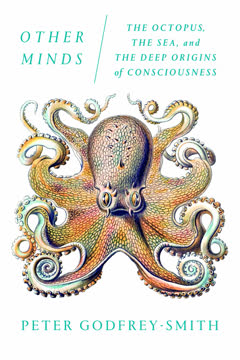Key Takeaways
1. Consciousness is the foundation of human experience and a central mystery in science
"Consciousness is our life. If you think about the sequence of our life, the things that matter to us after birth and before death are forms of consciousness, and so the funny thing is not, why is consciousness important, but, how can anything else be important?"
Fundamental importance. Consciousness forms the basis of our subjective experience, shaping our perceptions, thoughts, and emotions. It is the lens through which we interpret the world and ourselves. Despite its centrality to human existence, consciousness remains one of the most perplexing mysteries in science and philosophy.
Scientific challenge. The study of consciousness poses unique difficulties for researchers:
- It involves subjective experiences that are not directly observable
- It raises questions about the relationship between mind and matter
- It challenges our understanding of how physical processes in the brain give rise to subjective experiences
Interdisciplinary interest. The mystery of consciousness has attracted attention from various fields:
- Neuroscience
- Psychology
- Philosophy
- Physics
- Computer science
2. The "hard problem" of consciousness challenges our understanding of mind and matter
"The hard problem is to explain how and why we have qualitative phenomenal experiences. How could a physical system such as a brain also be an experiencer?"
Defining the problem. The "hard problem" of consciousness, as articulated by philosopher David Chalmers, refers to the difficulty in explaining how subjective, conscious experiences arise from objective, physical processes in the brain.
Key aspects of the hard problem:
- Why do we have subjective experiences at all?
- How can physical processes give rise to the qualitative feel of experiences?
- Why is there a seeming explanatory gap between neural activity and conscious experience?
Proposed approaches:
- Emergentism: Consciousness emerges from complex neural processes
- Panpsychism: Consciousness is a fundamental property of the universe
- Illusionism: The hard problem is based on a mistaken intuition about consciousness
3. Neuroscientific approaches seek to uncover the neural correlates of consciousness
"What I want to know initially is, what's the difference between your brain now, and your brain five minutes ago? The problem is that, with current scanning techniques, the conscious brain looks a lot like the unconscious brain."
Neural correlates of consciousness (NCCs). Researchers aim to identify the specific neural processes and structures associated with conscious experiences. This involves studying:
- Brain activity during different states of consciousness (e.g., waking, sleeping, anesthesia)
- Neural differences between conscious and unconscious processing
- Brain regions and networks involved in specific conscious experiences
Methodologies:
- Neuroimaging techniques (fMRI, EEG, MEG)
- Single-cell recordings
- Studies of brain-damaged patients
- Manipulations of consciousness (e.g., binocular rivalry, masking)
Challenges:
- Distinguishing correlates from causes of consciousness
- Accounting for the subjective nature of experience
- Integrating findings across different levels of analysis (from neurons to networks)
4. Philosophical debates on consciousness range from dualism to materialism
"I would argue, for example, that there are four kinds of objectivity, and that they tend to get confused. You can be objective in science in the sense of making intersubjectively validated observations—so you and I can agree between us about the nature of the tape recorder out there in the world."
Dualism vs. Materialism. The philosophical landscape of consciousness is marked by a spectrum of views:
- Dualism: Mind and matter are fundamentally different substances
- Materialism: Consciousness is reducible to physical processes in the brain
- Property dualism: Consciousness is an irreducible property of physical systems
- Neutral monism: Mind and matter are two aspects of a more fundamental reality
Key debates:
- The nature of subjective experience
- The relationship between consciousness and the physical world
- The possibility of artificial consciousness
- The extent of consciousness in nature (e.g., panpsychism)
Implications: These philosophical positions influence scientific approaches, interpretations of findings, and broader cultural understandings of consciousness and human nature.
5. The concept of "qualia" and subjective experience complicates scientific study
"Phenomenal consciousness is what I've just been talking about, that thing that we find so hard to understand how it could be a brain state, or how it could be supervened or determined by a brain state."
Defining qualia. Qualia refer to the subjective, qualitative aspects of conscious experiences – the "what it's like" to have particular sensations, emotions, or thoughts.
Challenges posed by qualia:
- They seem irreducible to physical descriptions
- They are private and seemingly ineffable
- They raise questions about the completeness of third-person scientific accounts
Debates surrounding qualia:
- Whether qualia exist as distinct entities
- Whether they can be explained in functional or physical terms
- Their role in theories of consciousness
Implications for science: The existence and nature of qualia challenge traditional scientific methodologies and raise questions about the limits of objective study in understanding subjective experience.
6. Theories of consciousness span from computational models to quantum explanations
"I think there's a general consensus that it's due to the correlation of some coalition of neurons; that you have to form a coalition of neurons. People call it various things; Edelman calls it the dynamic core, and others have the same basic idea."
Diverse theoretical landscape. Theories of consciousness range widely in their approaches and explanations:
- Global Workspace Theory: Consciousness arises from a "global workspace" of distributed neural activity
- Integrated Information Theory: Consciousness is intrinsic to systems with high levels of integrated information
- Higher-Order Thought Theories: Consciousness involves meta-cognitive awareness of mental states
- Quantum theories: Consciousness emerges from quantum processes in the brain
- Predictive Processing: Consciousness arises from the brain's predictive models of the world and self
Key considerations:
- Explanatory power: How well does the theory account for various aspects of conscious experience?
- Testability: Can the theory generate falsifiable predictions?
- Scope: Does the theory address both the easy and hard problems of consciousness?
Challenges: Integrating insights from different theoretical approaches and reconciling them with empirical findings remains a significant challenge in consciousness research.
7. First-person methodologies may complement third-person scientific approaches
"It is not given to man to be experts of their own experience; the fact of having an experience is not a qualification to be an expert reporter on it, just as much as walking in the garden doesn't make you a gardener, or a botanist. You need to have a very substantial amount of training."
Limitations of third-person approaches. Traditional scientific methods, focusing on objective, third-person observations, may be insufficient for fully understanding the subjective nature of consciousness.
Potential of first-person methods:
- Introspection and phenomenological analysis
- Meditation and mindfulness practices
- Systematic training in reporting subjective experiences
Neurophenomenology: This approach, proposed by Francisco Varela, aims to integrate first-person experiential reports with third-person neuroscientific data.
Challenges:
- Developing rigorous first-person methodologies
- Integrating subjective reports with objective data
- Overcoming skepticism about the reliability of introspection
8. Consciousness in non-human animals and artificial systems remains controversial
"I think it's obvious that other animals experience very much like we do. Of course they don't experience the same way; consciousness consists of different aspects, and some of them they have like we have, some of them they have in a different way, some they have that we don't have."
Animal consciousness. The extent and nature of consciousness in non-human animals is debated:
- Behavioral and neurological similarities suggest consciousness in many species
- Differences in cognitive complexity raise questions about the quality of animal consciousness
- Ethical implications for animal welfare and rights
Artificial consciousness. The possibility of conscious artificial systems raises profound questions:
- Can computational systems ever be truly conscious?
- What are the necessary conditions for machine consciousness?
- How would we recognize consciousness in artificial systems?
Philosophical zombies. The concept of philosophical zombies – beings behaviorally identical to humans but lacking consciousness – challenges our understanding of the relationship between behavior and inner experience.
9. Free will and the nature of self are intertwined with debates on consciousness
"We all think we have free will, and there's no way we can think away our own free will, because even if you try to think it away in a decision-making situation—if you just say, 'Well, I'm a determinist so I just wait and see what happens'—that is itself intelligible to us only as an exercise of freedom."
Free will debate. The nature of consciousness is closely tied to questions of free will:
- Compatibilism: Free will is compatible with determinism
- Libertarianism: Free will requires genuine metaphysical freedom
- Hard determinism: Free will is an illusion
Self and consciousness:
- The sense of self as a unifying aspect of conscious experience
- Debates about the reality and nature of the self
- Buddhist and other non-Western perspectives on selfhood and consciousness
Implications: Our understanding of consciousness deeply influences our conceptions of human agency, moral responsibility, and personal identity.
10. Interdisciplinary approaches may be key to advancing consciousness research
"I don't think that there is any simple explanation. I don't think it's particularly more difficult or less difficult than other topics. I would say that primarily it's been sociology of science factors that play into this."
Multifaceted challenge. The complexity of consciousness demands insights from various disciplines:
- Neuroscience
- Psychology
- Philosophy
- Physics
- Computer science
- Anthropology
- Eastern contemplative traditions
Potential synergies:
- Combining empirical data with philosophical analysis
- Integrating insights from different cultural and intellectual traditions
- Developing new methodologies that bridge subjective and objective approaches
Challenges:
- Overcoming disciplinary boundaries and biases
- Developing common frameworks and vocabularies
- Balancing specialized expertise with interdisciplinary collaboration
Future directions: Advancing consciousness research may require:
- Increased funding for interdisciplinary projects
- Development of new research paradigms and methodologies
- Greater dialogue between scientific and philosophical approaches
- Integration of insights from diverse cultural and intellectual traditions
Last updated:
FAQ
What's Conversations on Consciousness about?
- Exploration of Consciousness: The book is a collection of interviews with leading thinkers in consciousness studies, exploring their theories and perspectives.
- Diverse Perspectives: It includes insights from philosophers, neuroscientists, and psychologists on consciousness, free will, and the mind-body problem.
- Key Questions: Central questions include "What is consciousness?" and "How does it relate to brain activity?"
Why should I read Conversations on Consciousness?
- Engaging Dialogues: The book presents complex ideas in an accessible format, making it suitable for both lay readers and those familiar with the field.
- Insight from Experts: Readers gain access to thoughts from prominent figures like Daniel Dennett and Francis Crick, enriching their understanding of consciousness.
- Current Relevance: The discussions reflect ongoing debates in philosophy and neuroscience, making it a timely read for anyone interested in the mind.
What are the key takeaways of Conversations on Consciousness?
- No Consensus on Consciousness: The interviews reveal a lack of agreement among experts, highlighting the complexity of defining consciousness.
- Mind-Body Problem: The "hard problem" of consciousness is a recurring theme, questioning how brain processes lead to subjective experiences.
- Role of Qualia: The concept of qualia, or the subjective quality of experiences, is debated, with differing opinions on its significance.
What are the best quotes from Conversations on Consciousness and what do they mean?
- "Consciousness is a real working theatre." - Bernard Baars: This suggests consciousness is an active space where mental processes are displayed.
- "You’re just a pack of neurons." - Francis Crick: Emphasizes a materialistic view, suggesting experiences are reducible to neural activity.
- "The hard problem is the difficulty of understanding how physical processes in the brain can possibly give rise to subjective experiences." - Susan Blackmore: Highlights the central challenge in consciousness studies.
What is the "hard problem" of consciousness discussed in Conversations on Consciousness?
- Definition: Coined by David Chalmers, it refers to explaining why and how we have subjective experiences.
- Distinction from Easy Problems: Easy problems involve cognitive functions, while the hard problem focuses on qualitative aspects.
- Philosophical Implications: Raises questions about reality and suggests consciousness may be a fundamental aspect of existence.
How do different contributors view the relationship between consciousness and the brain in Conversations on Consciousness?
- Neural Correlates: Many emphasize identifying brain activities that correlate with conscious experiences.
- Emergence vs. Reduction: Some argue consciousness emerges from complex processes, while others see it as tied to neural activity.
- Functionalism Debate: Differing views on whether consciousness can be fully explained through brain functions.
What is the significance of "qualia" in the discussions within Conversations on Consciousness?
- Definition: Qualia are the subjective, qualitative aspects of experiences, like the redness of red.
- Debate on Existence: Some defend the reality of qualia, while others argue they are unnecessary for understanding consciousness.
- Implications: Central to the hard problem, challenging the reductionist view of consciousness.
How do the contributors address the concept of free will in Conversations on Consciousness?
- Determinism vs. Free Will: Many lean towards determinism, suggesting actions are influenced by brain states and environment.
- Illusion of Free Will: Some argue the feeling of free will is an illusion, with decisions predetermined by unconscious processes.
- Moral Responsibility: Raises questions about moral responsibility if free will is an illusion.
What role does personal experience play in understanding consciousness according to Conversations on Consciousness?
- Subjective Experience: Personal experience is crucial in shaping understanding, with contributors reflecting on their own thoughts.
- Introspection and Science: Some advocate introspective methods, while others argue for empirical approaches.
- Impact on Life Choices: Studies of consciousness influence personal lives, decisions, and philosophical outlooks.
How does Conversations on Consciousness address the potential for artificial consciousness?
- Possibility of AI Consciousness: Explores whether machines could achieve consciousness, with differing opinions on feasibility.
- Criteria for Consciousness: Debates on what criteria would define a conscious machine, referencing human consciousness complexity.
- Ethical Implications: Raises ethical questions about treatment and responsibilities towards conscious machines.
What future directions do the contributors suggest for consciousness research in Conversations on Consciousness?
- Interdisciplinary Approaches: Advocates for collaboration between neuroscience, philosophy, and psychology.
- Technological Advances: Highlights the importance of new technologies, like brain imaging, in uncovering consciousness.
- Continued Exploration: Expresses optimism about future discoveries, emphasizing the ongoing quest to understand consciousness.
How do different contributors define consciousness in Conversations on Consciousness?
- Varied Definitions: Perspectives range from biological bases to experiential aspects.
- First-Person vs. Third-Person: Importance of both subjective experiences and objective observations in defining consciousness.
- Consciousness as a Process: Some suggest it is a dynamic process influenced by cognitive and neural mechanisms.
Review Summary
Conversations on Consciousness presents interviews with leading thinkers on consciousness, exploring topics like free will, zombies, and the nature of subjective experience. Readers found it an accessible introduction to the field, praising Blackmore's insightful questions and the diverse perspectives presented. While some felt it was repetitive or outdated, many appreciated the book's ability to spark deep reflection on consciousness. Critics noted the lack of clear answers but acknowledged this reflects the current state of consciousness research. Overall, it's considered a thought-provoking overview for both newcomers and those familiar with the subject.
Similar Books










Download PDF
Download EPUB
.epub digital book format is ideal for reading ebooks on phones, tablets, and e-readers.







